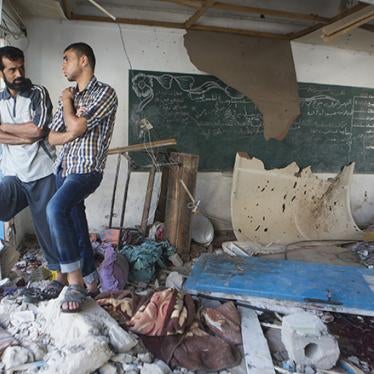(Jerusalem) – Armed conflict in Gaza between Israel and Palestinian armed groups in 2014 left thousands of victims of laws of war violations and rights abuses with nowhere to turn for justice, Human Rights Watch said today in its World Report 2015.
Fighting in July and August killed more than 1,500 civilians in the Gaza Strip, damaged hospitals and other critical infrastructure in Gaza, and destroyed the homes of more than 100,000 Palestinians, including Israeli attacks that appeared to be war crimes. Palestinian armed groups launched rockets and mortars indiscriminately toward Israeli population centers, also apparent war crimes.
“The appalling loss of civilian lives and property in Gaza was the predictable result of past fighting in which virtually no one responsible for violations was held to account,” said Sarah Leah Whitson, Middle East and North Africa director. “Countries that rightly advocate for justice for international crimes elsewhere should support Palestine’s accession to the International Criminal Court.”
In the 656-page world report, its 25th edition, Human Rights Watch reviews human rights practices in more than 90 countries. In his introductory essay, Executive Director Kenneth Roth urges governments to recognize that human rights offer an effective moral guide in turbulent times, and that violating rights can spark or aggravate serious security challenges. The short-term gains of undermining core values of freedom and non-discrimination are rarely worth the long-term price.
The prosecutor of the International Criminal Court opened a preliminary examination on January 16, following Palestine’s January 1 declaration requesting ICC jurisdiction.
During the 50 days of fighting, unidentified men in Gaza executed 25 Palestinians accused of being “traitors” for Israel. Hamas and the Palestinian Authority’s security forces committed serious abuses with impunity, including arbitrary detention and alleged torture of critics and political opponents.
Israel’s seven-year, punitive blockade of Gaza, supported by Egypt, left Palestinians whose homes were destroyed in the fighting unable to get reconstruction materials despite a United Nations-brokered plan to import them. Israel’s prohibition on nearly all exports pushed unemployment and poverty to record levels. The majority of Gaza residents depended on humanitarian assistance, and lacked adequate heating and access to food and clean water. Electricity cuts left pumps idle and led to flooding, including of sewage.
After three Palestinians in the West Bank abducted and killed three Israeli teenagers in June, Israeli forces conducted raids involving mass arbitrary arrests. Israeli forces in the West Bank repeatedly used lethal force against Palestinian demonstrators who posed no imminent threat to life, killing demonstrators and bystanders.
The rights situation in East Jerusalem worsened significantly after a group of Israelis murdered a Palestinian boy and security forces beat his cousin unconscious at a subsequent protest in June. In response to a spate of fatal attacks by Palestinians on Israelis, including an attack that killed five men in a Jerusalem synagogue in November, Israeli security forces blocked off East Jerusalem neighborhoods for days and re-initiated a policy of punitive demolitions of the family homes of suspected Palestinian attackers.
The Israeli government advanced plans for thousands of homes in illegal West Bank settlements, even as security forces demolished hundreds of Palestinians’ homes for being built without military permits, which are virtually impossible to obtain. The military undertook plans to forcibly transfer Bedouin communities near Jerusalem to a site inhabited by other Bedouin in the Jordan Valley.







